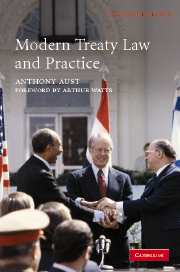Book contents
- Frontmatter
- Contents
- Foreword to the first edition by Sir Arthur Watts
- Preface to the second edition
- Articles of the Convention cited in the text
- Table of treaties
- Table of MOUs
- Table of cases
- Glossary of legal terms
- List of abbreviations
- Introduction
- 1 Vienna Convention on the Law of Treaties 1969
- 2 What is a treaty?
- 3 MOUs
- 4 Capacity to conclude treaties
- 5 Full powers
- 6 Adoption and authentication
- 7 Consent to be bound
- 8 Reservations
- 9 Entry into force
- 10 Treaties and domestic law
- 11 Territorial application
- 12 Successive treaties
- 13 Interpretation
- 14 Third states
- 15 Amendment
- 16 Duration and termination
- 17 Invalidity
- 18 The depositary
- 19 Registration and publication
- 20 Dispute settlement and remedies
- 21 Succession to treaties
- 22 International Organisations
- 23 Drafting and final clauses
- Appendices
- A Vienna Convention on the Law of Treaties 1969
- B Single instrument treaty
- C Single instrument MOU
- D Model single instrument MOU
- E Treaty constituted by an exchange of notes
- F Model exchange of notes recording an understanding
- G Treaty and MOU terminology: comparative table
- H Credentials
- I Full powers
- J General full powers
- K Final Act of the Vienna Conference
- L Instrument of ratification
- M Certificate of exchange of instruments of ratification
- N Model exchange of notes correcting an error
- O Procès-verbal of rectification
- P UN Registration Regulations
- Q List of overseas territories
- Index
A - Vienna Convention on the Law of Treaties 1969
from Appendices
- Frontmatter
- Contents
- Foreword to the first edition by Sir Arthur Watts
- Preface to the second edition
- Articles of the Convention cited in the text
- Table of treaties
- Table of MOUs
- Table of cases
- Glossary of legal terms
- List of abbreviations
- Introduction
- 1 Vienna Convention on the Law of Treaties 1969
- 2 What is a treaty?
- 3 MOUs
- 4 Capacity to conclude treaties
- 5 Full powers
- 6 Adoption and authentication
- 7 Consent to be bound
- 8 Reservations
- 9 Entry into force
- 10 Treaties and domestic law
- 11 Territorial application
- 12 Successive treaties
- 13 Interpretation
- 14 Third states
- 15 Amendment
- 16 Duration and termination
- 17 Invalidity
- 18 The depositary
- 19 Registration and publication
- 20 Dispute settlement and remedies
- 21 Succession to treaties
- 22 International Organisations
- 23 Drafting and final clauses
- Appendices
- A Vienna Convention on the Law of Treaties 1969
- B Single instrument treaty
- C Single instrument MOU
- D Model single instrument MOU
- E Treaty constituted by an exchange of notes
- F Model exchange of notes recording an understanding
- G Treaty and MOU terminology: comparative table
- H Credentials
- I Full powers
- J General full powers
- K Final Act of the Vienna Conference
- L Instrument of ratification
- M Certificate of exchange of instruments of ratification
- N Model exchange of notes correcting an error
- O Procès-verbal of rectification
- P UN Registration Regulations
- Q List of overseas territories
- Index
Summary
VIENNA CONVENTION ON THE LAW OF TREATIES
The States Parties to the present Convention,
Considering the fundamental role of treaties in the history of international relations,
Recognizing the ever-increasing importance of treaties as a source of international law and as a means of developing peaceful co-operation among nations, whatever their constitutional and social systems,
Noting that the principles of free consent and of good faith and the pacta sunt servanda rule are universally recognized,
Affirming that disputes concerning treaties, like other international disputes, should be settled by peaceful means and in conformity with the principles of justice and international law,
Recalling the determination of the peoples of the United Nations to establish conditions under which justice and respect for the obligations arising from treaties can be maintained,
Having in mind the principles of international law embodied in the Charter of the United Nations, such as the principles of the equal rights and self-determination of peoples, of the sovereign equality and independence of all States, of non-interference in the domestic affairs of States, of the prohibition of the threat or use of force and of universal respect for, and observance of, human rights and fundamental freedoms for all.
- Type
- Chapter
- Information
- Modern Treaty Law and Practice , pp. 453 - 487Publisher: Cambridge University PressPrint publication year: 2007



